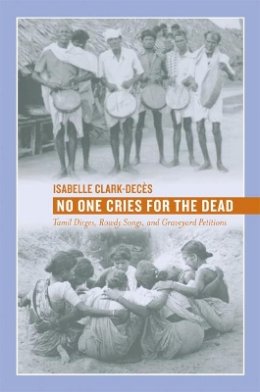28%OFF

Stock image for illustration purposes only - book cover, edition or condition may vary.
No One Cries for the Dead: Tamil Dirges, Rowdy Songs, and Graveyard Petitions
Isabelle Clark-Decès
€ 40.99
€ 29.36
FREE Delivery in Ireland
Description for No One Cries for the Dead: Tamil Dirges, Rowdy Songs, and Graveyard Petitions
Paperback. Num Pages: 252 pages, black & white illustrations. BIC Classification: 1FKA; JHBT. Category: (P) Professional & Vocational. Dimension: 229 x 152 x 19. Weight in Grams: 463.
At South Indian village funerals, women cry and lament, men drink and laugh, and untouchables sing and joke to the beat of their drums. No One Cries for the Dead offers an original interpretation of these behaviors, which seem almost unrelated to the dead and to the funeral event. Isabelle Clark-Deces demonstrates that rather than mourn the dead, these Tamil funeral songs first and foremost give meaning to the caste, gender, and personal experiences of the performers.
At South Indian village funerals, women cry and lament, men drink and laugh, and untouchables sing and joke to the beat of their drums. No One Cries for the Dead offers an original interpretation of these behaviors, which seem almost unrelated to the dead and to the funeral event. Isabelle Clark-Deces demonstrates that rather than mourn the dead, these Tamil funeral songs first and foremost give meaning to the caste, gender, and personal experiences of the performers.
Product Details
Format
Paperback
Publication date
2005
Publisher
University of California Press United States
Number of pages
252
Condition
New
Number of Pages
252
Place of Publication
Berkerley, United States
ISBN
9780520243149
SKU
V9780520243149
Shipping Time
Usually ships in 7 to 11 working days
Ref
99-1
About Isabelle Clark-Decès
Isabelle Clark-Deces is Associate Professor of Anthropology at Princeton University and the author of Religion against the Self: An Ethnography of Tamil Rituals (2000).
Reviews for No One Cries for the Dead: Tamil Dirges, Rowdy Songs, and Graveyard Petitions
"In this book, isabelle Clark-Deces gives us a clear-eyed view of the bond between the state of untouchability in India, and the pain of death and irretrievable loss. This is not a distanced work: the reader is always right there with the people Clark-Deces writes about; one can see them and hear their voices as one reads. The author also ... Read more
